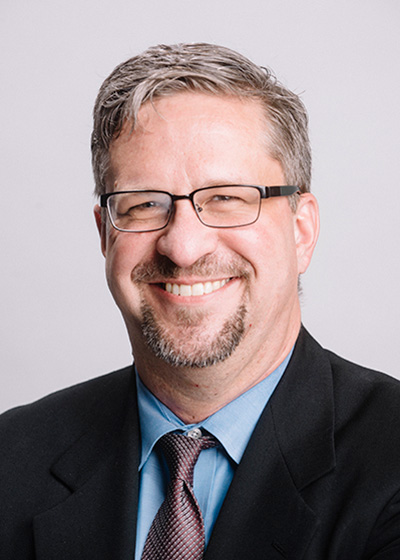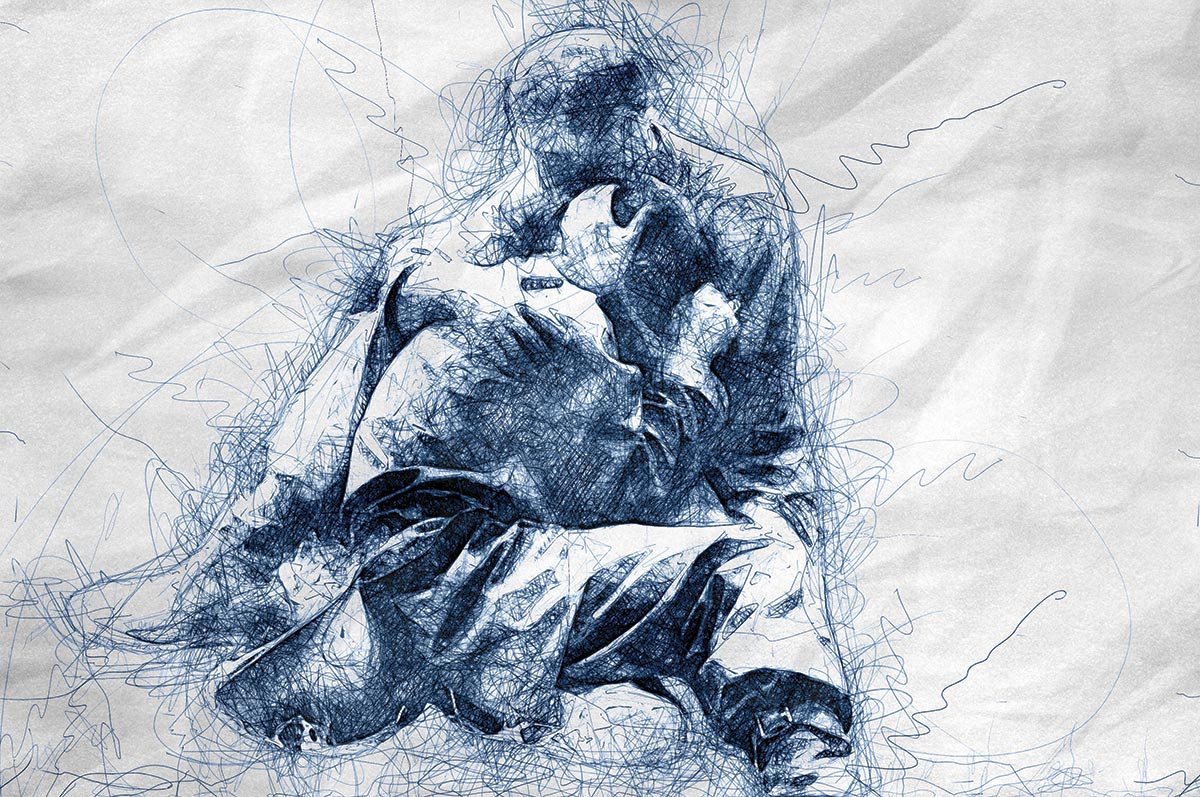Healing the Minds of a Nation
A conflict-ravaged nation has never had proper mental health counseling services.
A Regis professor and his team are changing that — by going where no one in Ukraine has gone before.
In the woods of northern Ukraine, Josh Kreimeyer held a squishy toy Koosh ball.
Kreimeyer, a Regis assistant professor of marriage and family therapy, was leading a mental health retreat for a Ukrainian military veteran and his wife. While using the Koosh ball to facilitate some light mental exercises, Kreimeyer learned something that got his attention.
“I found out partway through the retreat the veteran had been held captive and had all of his teeth pulled out with pliers,” Kreimeyer said. “And I’m doing games with a Koosh ball.”
It was summer 2019, and this veteran had recently returned from the front lines of the Ukrainian-Russian conflict, a deadly struggle between pro-Europe Ukrainians and Russia-backed separatist militias in eastern Ukraine. Together, he and his wife had signed up for the retreat — the first of its kind in the formerly Soviet-controlled nation that has never had clinical mental health counseling services.
“In America, even if you don’t use counseling, it’s there. ... Ukrainians don’t have that,” Kreimeyer said. “I think they feel so oppressed, like there’s not an outlet for them, so the gift we bring is huge.”
By developing a multifaceted mental health treatment plan, Kreimeyer and his team are starting the field of trauma-focused counseling in Ukraine from the ground up. “We basically built the field of counseling in Ukraine,” Kreimeyer said. “It didn’t exist before.”
Through connections with schools, government officials and a key Ukrainian-American professor, Kreimeyer worked with a small group to develop Ukraine’s first-ever accredited postgraduate degree for trauma-informed clinical counseling. They also started Open Doors, the nation’s first outpatient counseling center that meets American standards of care, with Kreimeyer and his team even building tables and setting up network servers themselves. The center opened in summer 2018 in the capital city of Kyiv.
The team is working to create a nationwide plan for mental health care, at the request of a vice prime minister of Ukraine.
Kreimeyer and his team are filling a dire need in the eastern European nation, as the armed Ukrainian-Russian conflict has escalated during the past decade. Through February 2019, as many as 13,000 people had been killed and 30,000 wounded in Ukraine, according to United Nations estimates.
“In America, even if you don’t use counseling, it’s there. ... Ukrainians don’t have that,” Kreimeyer said. “I think they feel so oppressed, like there’s not an outlet for them, so the gift we bring is huge.”
Kreimeyer is doing the work in Ukraine as a volunteer while continuing to teach at Regis. His team, all volunteers, include faculty, alumni and students from Regent University in Virginia Beach, Va., where this year he completed a doctorate program in Counselor Education and Supervision.
So far, a considerable amount of funding for these projects has come directly from the team members themselves. They have also received some support from Ukrainian refugees who have relocated to Canada.
Olya Zaporozhets, Ph.D., a Regent professor and Ukrainian national, initiated the work in her home country through a partnership between her university and a Christian school in southern Ukraine. She, Kreimeyer and their team initially met with the Ukrainian government in 2016. The rst crop of students from the counselor education program earned diplomas in 2017.
Zaporozhets estimates that more than 60 students have completed the program, with 23 new students soon to follow. Diplomas are now offered through the nationally prestigious Taras Shevchenko National University in Kyiv.
Kreimeyer, who formerly served as a Russian linguist in the U.S. Army, also developed Ukraine’s first counseling retreats to serve Ukrainian veterans.
“I know our desired legacy in Ukraine would be a wave of healing across the nation,” Kreimeyer said. “I want healing to sweep over so that counseling can be accepted as a form of help, just like they view healthcare. Because they desperately need it.”
Assistant Professor Josh Kreimeyer
Cultural Challenges
The challenge of building Ukraine’s counseling field is a steep one, fraught with cultural obstacles that provide clues to why Ukraine has never previously had proper counseling services. Many Ukrainians have difficulty trusting the intentions of counselors, Kreimeyer said. Under Soviet rule, Ukrainians who spoke too freely could be reported by spies, and more recently, Russian forces have used psychological warfare against Ukrainians.
“That is what psychology meant to most [Ukrainians], that it was something people in white coats did to mess with your head — to get inside and hurt you,” he said. “It was not something that was to help you.”
The Ukrainian language provides a hint of how many of the nation’s residents have learned to stu their emotions. The term “kammenoye litso” (in English transliteration), meaning “stone-faced,” refers to the emotionless facade many Ukrainians have adopted.
“I do believe that it’s probably something that comes with the Communist culture,” Zaporozhets said. “Just the stone wall, having a certain front, not showing emotion, not showing weakness — because emotion may be associated with weakness.”
Ukrainians also aren’t accustomed to the cost or the social stigma of counseling. As Ukrainian refugees in Canada continue to provide nancial help, Kreimeyer and his team envision a system in which Americans too can support Ukrainian mental health care. Until then, paying for therapy is still a muddy issue.
“This is my passion, bringing students together with meeting a need in the community,” Kreimeyer said. “It’s just such a perfect fit.”
Kreimeyer has also faced the challenge of how best to train counselors who haven’t previously experienced a counseling session as a patient. One of Kreimeyer’s most effective tools is the shbowl model, which he uses in his classes at Regis. In this interactive method, a student simulates providing therapy to another student, while classmates watch and provide feedback. For the students Kreimeyer has worked with in Ukraine, this real-life method of learning has been revolutionary.
“I think a lot of Regis’ Jesuit and Ignatian teaching focuses on the experiential. The rst few Ukrainian students that I taught would cry and say thank you,” Kreimeyer said. “They’re so overwhelmed with how powerful that learning model is.”
Bringing Regis to Ukraine
Kreimeyer has used his Regis experience to strengthen his work in other ways.
As a professor, he helped initiate Welcome Home Warrior retreats at Regis’ Colorado Springs Campus. These retreats united his counseling students with military families to provide specialized services in a retreat setting. He models retreats for Ukrainian veterans in the same fashion.
So far, he has led several four-day retreats that have proven so effective that Ukrainians are asking for more. He plans to offer three more retreats in June 2020.
“This is my passion, bringing students together with meeting a need in the community,” Kreimeyer said. “It’s just such a perfect fit.”
One of his most meaningful moments from the retreats came with that first Ukrainian veteran whose teeth had been pulled out by his Russian captors.
Kreimeyer brought out a special “challenge coin” from Regis’ Military and Veterans Services office that features the seals of the branches of the military, the Regis crest and the American flag. In a special ceremony at the end of the emotional retreat, Kreimeyer gave the veteran the challenge coin in a handshake, bringing the man to tears.
“It was just so meaningful,” Kreimeyer said. “I was overwhelmed too, by him and his wife being the first people to step up — in this country where psychology was weaponized — to say, ‘We want some help.’”
The veteran was so pleased with the retreat that he and his wife referred several people to Kreimeyer after they returned home.
“Josh is able to connect,” Zaporozhets said. “He’s able to dialogue and teach things that may be foreign to the culture, but at the same time, are needed.”
United Nations
Kreimeyer’s years of work in Ukraine have gained international attention.
Earlier this year, his experiences earned him a contract position with the United Nations as a consultant. He teaches psycho-social skills to Ukrainian psychologists who work with people affected by war. One of these trainings took place when he visited Kyiv this fall.
Outside of his U.N. work, Kreimeyer and his team created a Ukrainian curriculum in child mental health therapy, which includes sending counseling students to volunteer at a local orphanage. The team also is working on a family therapy curriculum, while developing plans to open other regional counseling centers. They are connecting with funding sources to provide scholarships for counseling students.
The work in Ukraine has already been such a success that officials in the European nations of Kosovo and Armenia have asked for the same support for clinical counseling, Kreimeyer said. Given the foundation Kreimeyer and his team have built in Ukraine, that kind of expansion may soon be possible.
Kreimeyer doesn’t put limits on the potential benefits of his team’s work. The heart of that mission, Kreimeyer says, is the Ignatian call: “Go forth and set the world on fire.”
“I want to get out there,” he said. “I don’t want to sit in my office and just wax theologically and philosophically. I love doing that, but there’s such need in the world. People in Ukraine that I’ve grown to love are so in need.”
Praying for a Sign
Kreimeyer may never have gone to Ukraine if he hadn’t had a chance encounter with Olya Zaporozhets, his team leader, during an interview for his Ph.D. program with Regent University.
Before interviewing for the program, Kreimeyer said he prayed for a sign that would show him whether the pro- gram was right for him. Having been a Russian linguist in the U.S. Army, he recognized that Zaporozhets was speaking with a Russian-sounding accent when he entered the building for his interview.
“He’s not afraid of a challenge,” Zaporozhets said. “He’s not afraid of something new. As a matter of fact, I’m not sure if he’s afraid of anything.”
He struck up a conversation with her, not knowing that she would be his interviewer that day.
“My file had no indication I spoke Russian, yet I still get assigned to this person as my interviewer,” he said. “So I was like, ‘OK, that’s the sign.’”
He and Zaporozhets quickly struck up a professional relationship, and with Kreimeyer’s extensive experience in both the military and counseling, he soon joined the leadership team that is making waves in mental health care across the capital city of Kyiv.
Since their first steps, Zaporozhets says Kreimeyer’s ability to provide optimism and vision has made him an ideal partner for the project.
“He’s not afraid of a challenge,” Zaporozhets said. “He’s not afraid of something new. As a matter of fact, I’m not sure if he’s afraid of anything.”

